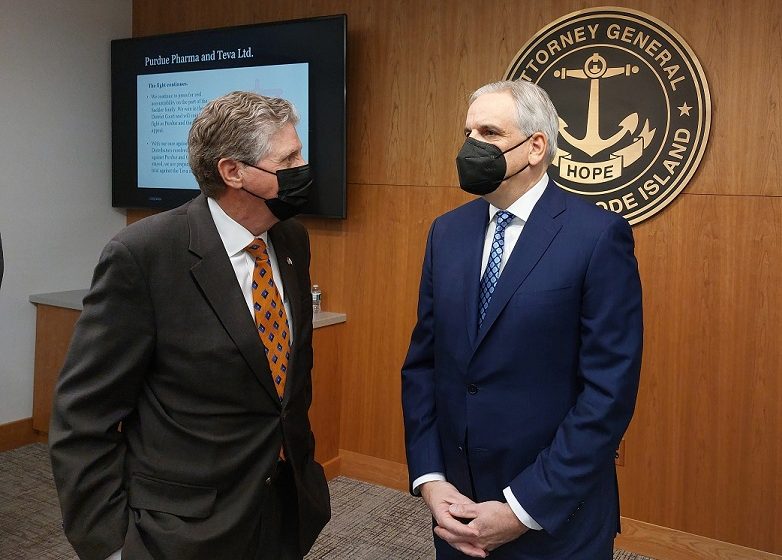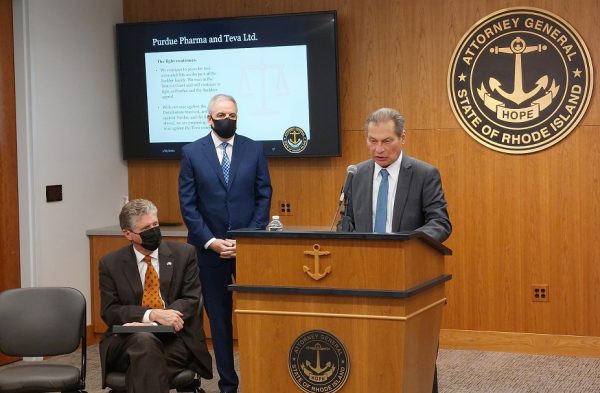Attorney General Neronha, State and Municipal Leaders Announce Settlement with Opioid Distributors, Bringing Rhode Island’s Opioid Litigation Recoveries to over $114 Million

Agreement also reached between Attorney General Neronha and 39 cities and towns, ensuring settlement funds are used to directly address the opioid crisis
PROVIDENCE, R.I. – Attorney General Peter F. Neronha, joined by Governor Daniel J. McKee, announced today that Rhode Island will join the national opioid settlement with three major opioid distributors that will provide over $90 million in funding for state and local efforts to address Rhode Island’s opioid crisis.
Under the terms of this state-specific deal, the Attorney General has ensured that the State and its cities and towns will receive these funds whether or not the national settlement takes effect next July. This settlement also provides for accelerated payments, with the first payment to arrive within two weeks – about six months earlier than it would under the national deal. Payments will be spread out over 18 years.
“No amount of money will ever be enough to undo the harm suffered by Rhode Islanders throughout the ongoing opioid epidemic. But through this settlement, we can bring in much-needed funding to the state and municipalities to respond to the challenges brought on by this epidemic, which have grown particularly acute during the Covid-19 pandemic,” said Attorney General Neronha. “We’ve already seen the kind of powerful benefits funding like this can bring to our state. For example, last summer our Office committed $1 million from a separate opioid settlement to address a critical and immediate need in Rhode Island’s naloxone supply. I am grateful to have been able to work with our cities and towns to arrive at an agreement and ensure that these funds can get to work to support treatment and recovery efforts throughout our state.”
The settlement resolves Rhode Island’s litigation against the country’s three largest pharmaceutical distributors — McKesson, Cardinal Health, and AmerisourceBergen — for the companies’ roles in the opioid epidemic. This settlement follows a deal reached by the same distributors and 45 other states in July 2021, but Rhode Island’s settlement ensures the state’s recovery will hold regardless of whether the global settlement proceeds and guarantees that Rhode Island will receive money sooner.
Rhode Island’s deal also secures millions of dollars in additional funds from the distributors to compensate the state for its substantial investment in the litigation of the case against them.
Together with settlements secured by Attorney General Neronha against opioid manufacturer Johnson & Johnson for $21 million and consulting firm McKinsey & Co. for $2.5 million, Rhode Island’s opioid litigation recoveries total more than $114 million over the next 18 years.
“The opioid crisis is one of the most devastating issues that impacts all 39 of our cities and towns. Today’s announcement is a powerful example of what can happen when our local communities and the State work together to tackle an issue head on,” said Governor Dan McKee. “As former Mayor, I understand that our cities and towns are on the front lines of the opioid epidemic. As Governor, I am committed to working with our local leaders, the Attorney General and others to not only hold big drug manufacturers accountable, but to ensure our communities have the treatment and recovery recourses they need.”
“We congratulate the Attorney General and his team for this tremendous outcome. This settlement will have a profound and immediate benefit for our communities. The combination of foresight, persistence and hard work by the Attorney General has ensured that services, support and critical treatment for the many Rhode Islanders harmed by the opioid crisis will be funded for years to come,” said Speaker K. Joseph Shekarchi.

President of the Senate Dominick J. Ruggerio said, “The opioid crisis has touched every corner of Rhode Island, impacting far too many loved ones, friends and neighbors. I have been proud to work with my colleagues in the General Assembly on vital efforts such as the Good Samaritan Overdose Prevention Act, increased access to Narcan, and the creation of revenue sources to address the crisis. I’m deeply grateful for the Attorney General’s leadership and commitment on the issue. The resources that will soon be brought to bear on the local and state levels thanks to the settlement announced today will make a real difference in our work to end this crisis.”
Attorney General Neronha also announced an agreement with all Rhode Island’s cities and towns to share and use these opioid litigation recoveries to fight the opioid crisis. The agreement provides all 39 Rhode Island cities and towns with direct funding from the settlements, while ensuring that the majority of the funds will go toward coordinated, holistic approaches to address the opioid epidemic statewide, guided by input from municipal leaders, public health experts, and community representatives.
Because all cities and towns have joined this agreement, Rhode Island has been able to maximize its recovery.
“Too many lives have been lost as the result of the growing opioid epidemic facing our city, state and nation,” said Mayor Jorge O. Elorza, Providence. “Providence is proud to have supported the national opioid settlement agreements as we have proudly been at the forefront of this public health crisis, supporting our community and providing vital prevention, training, and treatment programs for those impacted by the opioid epidemic. This settlement is an important step forward to hold the pharmaceutical industry and opioid distributors accountable for their actions while securing urgently needed funds for long-term recovery efforts. The path to a successful recovery from the opioid crisis is tied to the success of our neighbors and having the full state’s participation is promising. We are optimistic that with this support our community and communities across the country will have the resources to overcome this deadly epidemic.”
Payments from the settlement agreements to the municipalities and State will commence almost immediately, with the first payment expected within weeks and the second payment to occur in July 2022. Expedited payments are important since Rhode Islanders are still suffering from substance use disorders and more resources are needed to respond to the crisis. According to the Rhode Island Department of Health, 384 Rhode Islanders died in 2020 after accidentally overdosing on drugs – the highest year on record – and there were 361 overdose fatalities last year.
Settlement with Opioid Distributors
The distributor settlement provides for over $90 million, paid over 18 years, to Rhode Island and all 39 cities and towns in the state, to be used exclusively for opioid abatement. The Office negotiated the settlement over the last several months, working closely with Rhode Island’s Governor, House and Senate leadership, the Executive Office of Health and Human Services, and the state’s cities and towns.
Rhode Island’s recovery was determined using a formula developed for the global agreement, that takes into account the population of the state and the impact of the crisis on the state.
Rhode Island’s opioid recoveries to date include:
- $90,833,000 from McKesson, Cardinal Health and AmerisourceBergen over the next 18 years. Additional funds may be ordered by the Court to satisfy the State’s litigation costs in the case against them.
- $21,078,000 from Johnson & Johnson over the next nine years.
- $2,592,000 from McKinsey & Co. over the next five years.
The abatement funds secured by both the distributor settlement and the Johnson & Johnson settlement will be allocated based on the State’s agreement with Rhode Island’s cities and towns.
In addition to the funds, Rhode Island’s settlements include important agreements to strengthen controls and safeguards over opioid distribution and create greater transparency. For example, McKinsey & Co. will implement new ethics rules, stop advising companies on potentially dangerous scheduled drugs, and turn over thousands of internal documents for public portal. The distributors will create red flag systems for suspicious orders, report these orders to the Attorney General and Department of Health, report customers they have blocked, and implement monitoring and oversight.
Agreement Between State and 39 Municipalities to Share and Use Funds to Fight Opioid Crisis
Rhode Island’s newly announced agreement with all of the state’s cities and towns ensures that all the funds will be directed to opioid abatement – including expanding access to opioid use disorder prevention, intervention, treatment, and recovery. Under the agreement:
- 20% of the funds secured for abatement will go directly to all cities and towns based on a population-driven formula to be used solely for opioid abatement purposes.
- 80% of the funds secured for abatement will be overseen by the state’s Executive Office of Health and Human Services and allocated to opioid abatement programs throughout the state. In making these allocations, the Secretary of EOHHS will be informed by recommendations of an Advisory Committee, all subject to the state appropriations process.
The Advisory Committee, as required by the national settlement agreement, will be comprised of an equal number of state and municipal representatives, as well as expert and community representatives and will work closely with key organizations coordinating the state’s response to the crisis, including the Governor’s Overdose Prevention and Intervention Task Force.
“EOHHS is grateful to the Office of the Rhode Island Attorney General for their dedicated work to finalize the details of the settlement with opioid distributors,” said Rhode Island Executive Office of Health & Human Services’ Secretary Womazetta Jones. “This funding is crucially needed to help Rhode Islanders who are facing issues of addiction and who need treatment, recovery, harm reduction and rescue services. The Governor’s Overdose Prevention and Intervention Task Force has been working with experts and community partners to maximize services for some of our most vulnerable Rhode Islanders, with a focus on eliminating racial, ethnic, and income disparities in allocation of care. EOHHS looks forward to continuing to work with the Attorney General and the other members of the Advisory Committee to ensure that these dollars are spent effectively to help Rhode Islanders.”
A timeline of Rhode Island’s opioid litigation
In 2018, the Rhode Island Office of the Attorney General filed a lawsuit against the country’s largest opioid distributors and manufacturers seeking to hold them accountable for the role they played in creating and fueling the opioid crisis in Rhode Island.
That same year, then-Lt. Governor McKee organized dozens of municipalities to file suit against the pharmaceutical drug manufacturers and wholesale drug distributors that made the opioid epidemic possible with the goal of ensuring settlement funds would go directly to cities and towns to help them combat this crisis.
In 2019, the most high-profile defendant in that lawsuit, Purdue Pharma, filed for bankruptcy, effectively pausing the Attorney General’s lawsuit against both Purdue and the Sackler family.
On July 19, 2021, Attorney General Neronha and eight other attorneys general objected to a proposed settlement with Purdue and the Sacklers on the grounds that it was insufficient and that it provided for bankruptcy protection to the Sacklers, even though they did not file for bankgruptcy and have never fully accounted for their assets.
On December 16, 2021, U.S. District Judge Colleen McMahon rejected the bankruptcy settlement. That decision has been appealed to the Second Circuit Court of Appeals.
Rhode Island’s opioid lawsuit is proceeding against various companies owned by Israeli parent company Teva Ltd. for their role in the manufacturing, marketing and sale of branded and generic opioids in Rhode Island. A jury trial in that case is scheduled to begin in mid-March 2022 in Providence County Superior Court.
View/download presentation on today’s announcement